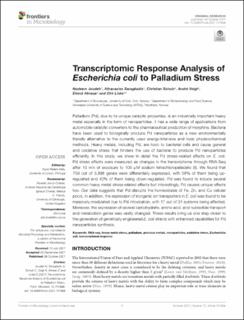| dc.contributor.author | Joudeh, Nadeem | |
| dc.contributor.author | Saragliadis, Athanasios | |
| dc.contributor.author | Schulz, Christian | |
| dc.contributor.author | Voigt, Andre | |
| dc.contributor.author | Almaas, Eivind | |
| dc.contributor.author | Linke, Dirk | |
| dc.date.accessioned | 2021-10-12T07:34:36Z | |
| dc.date.available | 2021-10-12T07:34:36Z | |
| dc.date.created | 2021-10-11T13:23:06Z | |
| dc.date.issued | 2021 | |
| dc.identifier.citation | Frontiers in Microbiology. 2021, . | en_US |
| dc.identifier.issn | 1664-302X | |
| dc.identifier.uri | https://hdl.handle.net/11250/2789136 | |
| dc.description.abstract | Palladium (Pd), due to its unique catalytic properties, is an industrially important heavy metal especially in the form of nanoparticles. It has a wide range of applications from automobile catalytic converters to the pharmaceutical production of morphine. Bacteria have been used to biologically produce Pd nanoparticles as a new environmentally friendly alternative to the currently used energy-intensive and toxic physicochemical methods. Heavy metals, including Pd, are toxic to bacterial cells and cause general and oxidative stress that hinders the use of bacteria to produce Pd nanoparticles efficiently. In this study, we show in detail the Pd stress-related effects on E. coli. Pd stress effects were measured as changes in the transcriptome through RNA-Seq after 10 min of exposure to 100 μM sodium tetrachloropalladate (II). We found that 709 out of 3,898 genes were differentially expressed, with 58% of them being up-regulated and 42% of them being down-regulated. Pd was found to induce several common heavy metal stress-related effects but interestingly, Pd causes unique effects too. Our data suggests that Pd disrupts the homeostasis of Fe, Zn, and Cu cellular pools. In addition, the expression of inorganic ion transporters in E. coli was found to be massively modulated due to Pd intoxication, with 17 out of 31 systems being affected. Moreover, the expression of several carbohydrate, amino acid, and nucleotide transport and metabolism genes was vastly changed. These results bring us one step closer to the generation of genetically engineered E. coli strains with enhanced capabilities for Pd nanoparticles synthesis. | en_US |
| dc.language.iso | eng | en_US |
| dc.publisher | Frontiers | en_US |
| dc.relation.uri | doi.org/10.3389/fmicb.2021.741836 | |
| dc.rights | Navngivelse 4.0 Internasjonal | * |
| dc.rights.uri | http://creativecommons.org/licenses/by/4.0/deed.no | * |
| dc.title | Transcriptomic Response Analysis of Escherichia coli to Palladium Stress | en_US |
| dc.type | Peer reviewed | en_US |
| dc.type | Journal article | en_US |
| dc.description.version | publishedVersion | en_US |
| dc.source.pagenumber | 23 | en_US |
| dc.source.journal | Frontiers in Microbiology | en_US |
| dc.identifier.doi | 10.3389/fmicb.2021.741836 | |
| dc.identifier.cristin | 1944913 | |
| dc.relation.project | Norges forskningsråd: 294605 | en_US |
| cristin.ispublished | true | |
| cristin.fulltext | original | |
| cristin.qualitycode | 2 | |

